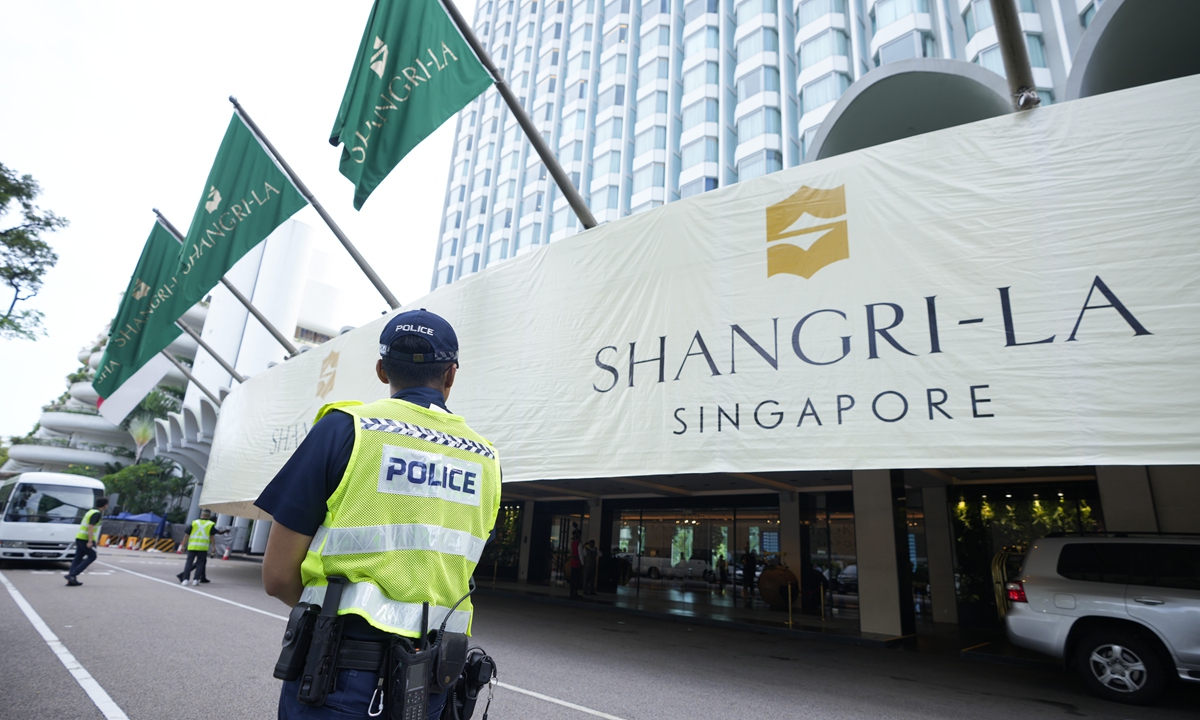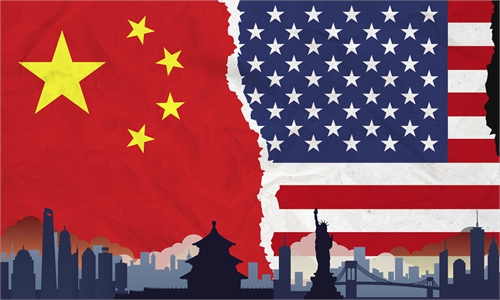
Police officers stand guard near the entrance of the Shangri-La Hotel, the venue for the 20th International Institute for Strategic Studies Shangri-La Dialogue, Asia's annual defense and security forum, in Singapore on June 2, 2023. Photo: VCG
The weekend started from Friday in Shangri-La Hotel, Singapore, with military uniforms and suits coming and going for bilateral meetings, speeches and discussions on security development in the Asia-Pacific region.
Amid the hustle and bustle, the Chinese People's Liberation Army (PLA) delegation has attracted much attention, especially with the debut attendance of Chinese State Councilor and Minister of National Defense Li Shangfu at the Shangri-La Dialogue.
Li will make a major speech on "China's New Security Initiatives" on Sunday morning. Li's attendance at the Shangri-La Dialogue will be vital to expound China's vision on global and regional stability. China-proposed Global Security Initiative (GSI) for common, comprehensive, cooperative and sustainable security is crucial to addressing regional and global security challenges aggravated by unilateralism and confrontations, experts said.
There has also been wide speculation on whether there will be certain encounter between Li and his US counterpart Lloyd Austin at the event despite an official meeting is unlikely given the fact that the US had been constantly infringing on China's interests.
Based on a video clip posted on Twitter, at around 8:00 pm, Li and US Secretary of Defense Lloyd Austin shook hands at the Shangri-La Hotel before the opening dinner, the first time the two have met since Li assumed office.
It's human, normal and part of Chinese culture, which goes back 5,000 years, and Chinese culture is rich enough to receive a gesture of greeting from anyone, any country, former Indonesian ambassador to China Imron Cotan told Global Times on Friday, adding that China has been playing the role of a responsible member of the international community, including in the security field.
The 20th Shangri-La Dialogue, a key security summit in the Asia-Pacific, gets under way in Singapore from Friday to Sunday. The dialogue, organized by the London-based International Institute of Strategic Studies (IISS), is expecting about 600 delegates from more than 40 countries and regions.
US Secretary of Defense Lloyd Austin will deliver a speech on Saturday, themed, "US leadership in the Indo-Pacific."
The heat turns up
Australian Prime Minister Anthony Albanese delivered the opening speech at the Shangri-La Dialogue on Friday evening, during which he called for greater engagement between the US and China, saying a breakdown in dialogue between the superpowers could have devastating consequences for the world.
Communications between Chinese and US militaries have gone through serious difficulties for over half a year due to a series of US moves provoking China over the latter's core interests, especially the Taiwan question.
That includes former US House speaker Nancy Pelosi's visit to Taiwan island in August 2022, the meeting between Taiwan regional leader Tsai Ing-wen and sitting US House Speaker Kevin McCarthy in April this year in the US.
Prior to the event, the heat of the tension has been further turned up by the US and some of its allies, including a US RC-135 spy plane making an intrusion into PLA Navy Shandong aircraft carrier group's training zone in the South China Sea.
During his visit to Japan on Thursday, Austin stated US unwavering commitment to Japan, including "extended deterrence provided by the full range of US conventional and nuclear capabilities." The two sides discussed moves to strengthen cooperation. The Japanese side specifically highlighted the deployment of MQ-9 Reapers to Japan, the establishment of the Marine Littoral Regiment in the country, and increased exercises between the two nations' militaries.
Also on Thursday, IISS released "The New IISS Asia-Pacific Regional Security Assessment 2023 Highlights The Evolving Dynamics of the Asia-Pacific Regional Security Order." The report starts with the tone, "Despite the continuing war in Ukraine, China's growing power and strategic extroversion continue to 'make the strategic weather' and remain the leading long-term challenges to the existing international order, particularly in the Asia-Pacific."
The game is on, observers noted, with some regional analysts disagreeing the narrative and moves from the Western side.
"The report frames China as the disrupter of the status quo when US has spent the last year herding its allies for strategic and military encirclement of China and broken every commitment of the one-China policy that is the very basis of any relationship with China. It has been organizing an overlapping combination of AUKUS, NATO, and Japan, South Korea, the Philippines into war formation. AUKUS is an extremely aggressive development that threatens to wipe out ASEAN's strategic autonomy," John Pang, a former Malaysian government official and a senior research fellow at Perak Academy of Malaysia, told the Global Times.
China comes with confidence
Despite knowing the Shangri-La Dialogue is a platform dominated by Western countries to attack China, China comes anyway. Li's attendance at the Shangri-La Dialogue speaks for itself. It shows the PLA is willing to talk to regional countries, and jointly pursue Asia's stability, experts said.
China is showing its attitude - its military communication with other countries won't be impacted by tensions with the US. During the event, China will have face-to-face bilateral talks with defense chiefs from a dozen countries, and military dialogues will be unfolded at different levels, not just between defense ministers, Lieutenant General He Lei, former vice president of the Academy of Military Sciences of the People's Liberation Army (PLA), told the Global Times. He added that whatever the platform is designed for, China is confident to step on the stage and raise its voices, enhancing mutual communication with regional countries.
He made an overview of the goals of the Chinese delegation. First, China will introduce its Global Security Initiative proposed by Chinese President Xi Jinping, advocating a concept of common security, respecting and safeguarding the security of every country. Second, China will interpret the spirit of the 20th National Congress of the Communist Party of China, making others know that Chinese modernization offers a new approach to the world. Third, explaining and safeguarding China's diplomatic and defense policies, introducing a multi-dimensional and comprehensive China to the world. Fourth, responding to the slanders and smears made by the US-led West toward China, like the so-called "military threat" posed by China, safeguarding Chinese national interests. And fifth, China is to make as many friends as possible.
A fierce debate between China and the US will be inevitable. But in a debate, the goal is not to convince the opponent. The goal is to win the audience, said a Singaporean observer who requested anonymity.
Different perspective
Where do Southeast Asian countries stand in the major power game between China and the US? It is a question that comes up time and again, and will be a major focal point during the ongoing dialogue.
On Friday evening, Cotan told Global Times that from an Indonesian perspective, people would like China and the US to have better ties. "Because if you compete, we will suffer," he said, adding, "we would like China to continue prospering, because a prosperous China will also benefit countries in the region."
Zhao Xiaozhuo, a researcher of international military relations at the PLA Academy of Military Science, said while the US Asia-Pacific security strategy emphasizes "war," "division" and "small clique," China's foreign policy emphasizes "peace," "development" and "big family."
The view is shared by regional observers. Pang told Global Times that the Global Security Initiative is committed to common, comprehensive, cooperative and sustainable security. It takes the security interests of all countries seriously, not just those the West favors for its geopolitical purposes. The rules-based order, on the other hand, stands for the maintenance of Western supremacy forever.
Anna Malindog-Uy, senior research fellow of Global Governance Institution, and vice president of External Affairs of the Asian Century Philippines Strategic Studies Institute, told the Global Times, "I think China's Global Security Initiative has touched the heart of Asia-Pacific countries precisely because it is an Asian way of resolving conflicts of interest and differences between and among nations, moving away from a Western-oriented direct confrontational-megaphone way of fixing or settling disputes, toward a more oriental or Asian way of dispute resolution, which puts a premium on the preservation of harmony at all costs, discords are kept low-key and as much as possible at the minimum, and exchanges between parties are cordial and pleasant filled with pragmatism and lots of patience, creativity, and goodwill.



